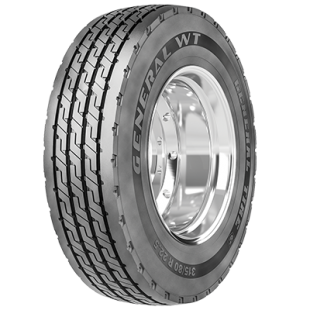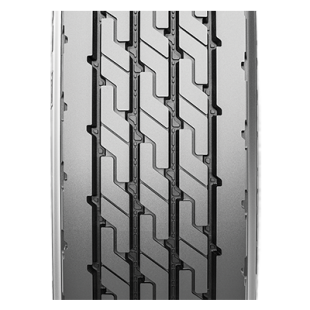General WT
Do you know which type of freight transport is the most important and practically irreplaceable in any large modern city? You might be surprised, but these are garbage trucks. Every day these giants on wheels drive around the city streets and saturate their belly with tens of tons of waste.
Garbage trucks themselves are large, heavy vehicles, but they become much heavier after being filled to capacity. And to withstand such a colossus and at the same time provide acceptable handling, special tires are needed. Most garbage trucks are usually equipped with standard tires, which negatively affects their resource and the driving characteristics of the car. Meanwhile, the American company General Tire produces special tires for garbage trucks and we will talk about them in this short review.
About General WT tires
General WT is a special tire designed and manufactured for garbage trucks. It is an all-weather tire with versatile use. General WT can be installed on both drive and steering wheels with equal success. Thanks to a special tread pattern, they provide excellent driving dynamics combined with excellent handling.
These tires are designed for heavy loads, which is not surprising given the weight of the cars themselves and the weight of the cargo they carry. And, perhaps, the main feature of these tires is the reinforced sidewalls, due to which the tire withstands repeated hits on curbs and similar obstacles.
Who produces
General WT tires are manufactured by the oldest American manufacturer - General Tire. The company has been on the market since 1915 and specializes only in the production of pneumatic tires. The quality of the company's modern products has grown significantly since this American manufacturer joined the German concern Continental AG.
What are these tires made of?
General WT, like all modern General Tire tires, is manufactured using high-quality manufacturing materials. At the base, synthetic rubber substitutes are used, into which, depending on the structural layer of the tire, one or another filler is added.
For example, the layer that is in direct contact with the road surface is made of rubber with the addition of silica particles, which, like an abrasive, provide sufficient friction for better grip. Conversely, the inner layer is made from a mixture of butyl rubber and latex. This mixture, when solidified, forms a material with an extremely high density and a complete absence of micropores, which allows the tire to retain the injected air for a long time.
Tire structure
The General WT is a tubeless, all-weather tire and this largely explains its design features. Structurally, General WT, like all modern tires, is multilayer.
The outer layer, also known as the tread, is designed to provide the highest possible grip on the road surface. In addition, due to the tread pattern, the tire provides efficient handling. For handling, these tires have 4 deep, self-cleaning radial grooves.
General Tire makes similar radial grooves on its steering tires. In both cases, the radial grooves provide directional stability both when driving in a straight line and when cornering. In addition to the large radial grooves, there are transverse grooves that, on the one hand, provide additional traction, and on the other hand, drain water from the contact patch.
The inner layers are reinforcing, made of rubber with a layer of wire weaving. In addition to wire weaving, metal belts are used for reinforcement, which runs along the central rib and ensures uniform adherence of the tread to the road surface throughout the contact patch. Sidewall reinforcement was applied in the same layer. This makes the tire more resistant to damage when hitting curbs or similar obstacles.
The inner layer provides maximum tightness of tires. As in other tires, a metal cord runs along the inner radius of the tire, which ensures an even fit of the tire to the rim.
Advantages and disadvantages
Now is the time to decide on the advantages and disadvantages of General WT. There are advantages and there are many of them.
- High strength and, as a result, durability. The manufacturer gives a warranty for General WT tires up to 65 thousand miles. This means that utilities or private waste disposal companies can save money by eliminating the need to regularly replace worn tires.
- The best combination of quality and price. General WT tires are presented in the mid-price segment, while in terms of quality they correspond to more expensive truck tires.
- Good handling on all road surfaces, both dry and wet. This is a very important point since garbage collection and removal should be performed regularly, regardless of the weather conditions.
- Good driving performance, regardless of the season. Despite the pronounced tread, General WT tires are characterized by low rolling resistance. Moreover, due to the good grip, these tires provide a short braking distance.
- Resistance to the effects of chemically aggressive substances. And this is a very important advantage considering that General WT tires are specially designed for garbage trucks.
- Self-cleaning function keeps General WT tires constantly clean. If debris gets stuck in the tread grooves, it is thrown out from there by centrifugal force when driving at speeds over 30 m/hr.
Are there any disadvantages? As such, there are no shortcomings. The only point is that General WT is not an ideal choice for high-speed driving. On the other hand, garbage trucks are not built to drive at high speeds.
Specifications
The performance of General WT tires is similar in many respects to the technical characteristics of a commercial tire designed for long-haul transportation. The only difference is in speed limits and in the range of loads.
Feedback on application
Most General WT tires are used in the USA, Canada, and Mexico. Therefore, opinions should be collected taking into consideration the utilities of these tires in the following countries. Immediately, we note that the drivers of garbage trucks, if not delighted with these tires, are at least happy with them. These tires are used in different climatic zones. And everyone notes that the tires performed well in hot Mexico, and in the temperate climate of the United States, and in cooler Canada.
Let's summarize
So, let's try to summarize what has been said in this review. Should you buy these tires or not?
General WT tires are identical in every way to tires that are bought for long-haul trucks. But there are small differences - General WT is much stronger on the sides, and therefore withstands numerous arrivals on the sidewalks. Again, the tread on the sidewalls contributes to a better ride on curbs. Well, in general, these tires are much stronger and more reliable than conventional truck tires, since they have to withstand more intense loads.
Again, if the question is whether to buy these tires or not, you need to remember that General WT is a specialized tire that is resistant to the effects of chemically aggressive substances. Other tires designed for regular trucks cannot boast of the same advantages. Therefore, there is only one conclusion: General WT is the best choice for garbage trucks, of course, provided that the tire dimensions correspond to the wheel rim dimensions.


